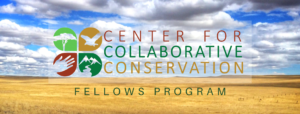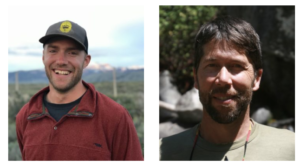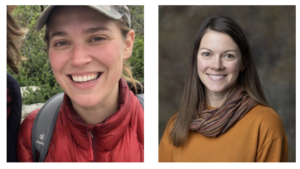
The Center for Collaborative Conservation (CCC) has announced its tenth cohort in their Conservation Fellows Program. This cohort is made up of six fellows, two teams and two individual fellows. The CCC awarded $48,000 to this cohort to support their research, engagement with collaborators, and participation in Fellows Program trainings until September 2021.
CCC fellowships challenge and train students, faculty, and conservation practitioners to engage with communities to enhance community livelihoods and conserve landscapes, while supporting collaborative education, practice and research at CSU.
Special Topic: Colorado Wolves
This year the CCC Fellows Program is focused on a timely topic—the potential wolf reintroduction to Colorado. In the summer of 2019, a lone wolf was confirmed in North Park, 65 miles west of Fort Collins, and in early 2020, a pack of wolves was confirmed in Moffat County in northwestern Colorado. In November 2020, Coloradoans will cast their votes on Ballot Initiative 107. This initiative would direct Colorado’s Wildlife Commission to restore and manage wolves in Colorado.
Ballot Initiative 107 has stirred conflict across Colorado. The recently published information sheet on Dialogue and Social Conflict about Wolves describes what drives this conflict, including different attitudes and beliefs about wolves and the effects they may or may not have on ecosystems and people. This information sheet is part of the People and Predator Series created by the CCC, the Center for Human-Carnivore Coexistence, and Colorado State University (CSU) Extension.
Developing Collaborative Solutions
“Collaboration is well-suited to navigating conflict around wolves,” said John Sanderson, CCC director. “If wolves are in Colorado’s future, collaboration that includes diverse stakeholders in respectful dialogue and shared decision-making can lead to better, longer-lasting outcomes for all sides.”
Each of the Fellows’ projects researches key social, management and policy dimensions of human-carnivore relationships that can help ranchers, wildlife managers, and policy makers navigate this contentious topic. Fellows will be working together on these interrelated projects. Fellows also will be collaborating with CSU faculty, CSU Extension, federal and state agencies, non-profit organizations and private ranchers.
CCC Fellows Program: Team Projects
Collaborative Conflict Prevention Programs for Minimizing Human-Carnivore Conflict: Enabling Factors and Applications to Colorado. Matthew Collins, M.S. student, Department of Human Dimensions of Natural Resources. Stewart Breck, Ph.D., Research Wildlife Biologist, USDA National Wildlife Research Center.

Ranching collaboratives have played important roles in minimizing carnivore-livestock conflicts and maintaining viable ranches. Yet, the process by which these collaboratives achieve success in reducing conflicts is poorly understood. This fellowship will: 1) identify what factors enable the formation and potential success of collaborative conflict-prevention programs, 2) build working relationships among project leads, collaborators, and Colorado collaboratives with an interest in forming conflict prevention programs, and 3) communicate research findings to these Colorado collaboratives to potentially facilitate the formation of carnivore-livestock conflict-prevention programs in Colorado.
Understanding Wolf-Livestock Depredation and the Policies and Management Practices that Affect Incident Reporting to Provide Recommendations in Colorado. Rae Nickerson, M.S. student, Department of Ecosystem Science and Sustainability. Alex Few, Ph.D., Northern Rockies Coordinator, Western Landowner’s Alliance, Working Wild Challenge.

For agricultural producers in Colorado, livestock depredation due to wolves is a major concern regardless of how wolves arrive on the landscape. Understanding the impact of wolves is complex and depredation data used to inform the creation of policy often suffer from scaling and scoping challenges that misrepresent the lived experiences of landowners.
This team will analyze the drivers influencing livestock depredation detection and reporting on multiple spatiotemporal scales (local, county, state), improving our understanding of when, where, and to what degree wolves impact livestock. Depredation data, surveys, and interviews will be collected in collaboration with landowners and producers operating on public, private, and tribal lands in California, Oregon, Washington, Idaho, Montana, Wyoming, Arizona, and New Mexico.
CCC Fellows Program: Individual Projects

Understanding, Measuring, and Addressing Social Conflict Surrounding Proposed Wolf Reintroduction in Colorado. Mireille Gonzalez, Ph.D. student, Department of Human Dimensions of Natural Resources.
This research seeks to characterize the state of social conflict over proposed wolf reintroduction in Colorado, and investigate guiding principles of stakeholder engagement processes that can help address these drivers of social conflict.
Specifically, this research will: 1) identify the drivers and indicators of social conflict surrounding proposed wolf reintroduction, 2) describe how to measure and characterize the drivers and indicators, 3) identify the potential stakeholder engagement processes for reducing social conflict, and 4) evaluate the feasibility and resources needed to implement these processes on the ground in Colorado.

Identifying Effective Policy and Governance Strategies for Predator Reintroduction. Brielle Manzolillo, M.S. student, Department of Forest and Rangeland Stewardship.
If ballot 107 passes in the fall of 2020, Colorado Parks and Wildlife will have several years to plan for wolf reintroduction and will face questions about how to do so in a way that is effective, inclusive, equitable, and legitimate. An opportunity exists to draw on the lessons learned from past reintroduction efforts in the Greater Yellowstone Ecosystem and the Mexican wolf reintroduction area and uncover the challenges that will face Colorado specifically. This project will: 1) identify how lessons learned from past wolf reintroduction efforts can inform policy and governance strategies for wolf reintroduction in Colorado, and 2) support efforts in Colorado by working with policy makers and land managers to identify the policy tools that will facilitate a successful reintroduction for both wolves and humans.
For more information about CCC’s Conservation Fellows Program, see the CCC Fellows Program web page or contact Kim Skyelander, kim.skyelander@colostate.edu.
The Center for Collaborative Conservation is part of the Warner College of Natural Resources at Colorado State University. The CCC’s mission is to build the capacity of organizations, communities, and future leaders to achieve conservation impact, while applying Colorado State University’s world-class research and education.